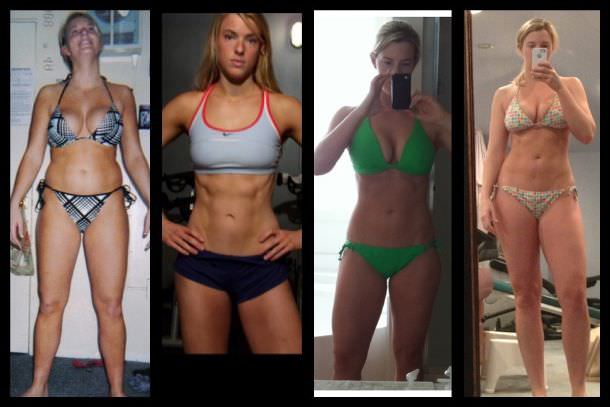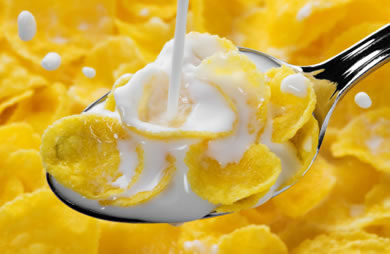|
"I am just big-boned. Everyone in my family is big-boned." At one point or another, you've probably heard your friends or family members utter these phrases. Heck, you may have even said similar things yourself. "My Mom is heavy. My Dad is heavy. I'll never be anything but heavy." "My sister has my Mom's lean body and I have my Dad's stocky body, so I will never be lean like her." So just how much of a role do genetics play in your body shape and size? If you have heavy parents, are you truly doomed to be heavy forever? When your parents are tall and lean, can you get away with eating more—without consequence? If your mom has wide hips, will shopping for jeans always be the bane of your existence? First and foremost, yes, genes do play a significant role in your body type, shape and size. There are three generally accepted body types: ectomorph, mesomorph and endomorph. Below is a table listing general characteristics of each body type. 3 Main Body Types
In general, if you are thin, have long limbs and a long neck and low body fat levels, you are an ectomorph. If you would describe yourself as an "athletic" build, and it's not hard for you to add body fat or muscle mass to your frame, you are a mesomorph. The mesomorphic body type is more common among men than women. If you have a softer, less athletic build, with larger hips and thighs, and you tend to easily gain weight, you are an endomorph. The endomorphic body type is more common in women than men. In addition to these three main body types, there are other general body shapes that describe how people carry or store body fat. You've probably heard people referring to themselves as "apple" shaped (tendency to gain weight in the midsection but have lean limbs), "pear" shaped (tendency to carry weight in the lower body) or a general "avocado" shape (a mix between an apple and a pear). While reading through the descriptions above, it's only natural to try and figure out which category you fit into. You might have found one that sounds exactly like you and your build. Or maybe it wasn't so clear which one you were. Very few people are one "pure" body type. Usually, we have some characteristics of one or more categories. I am a meso-ecto hybrid. I am very tall with an athletic build, broad shoulders and a narrow waistline, much like a mesomorph. At the same time, I have very long limbs, long and thin fingers and a long neck; all ectomorphic characteristics. Hybrid body types are quite common and if you found yourself nodding along to characteristics in two of the different categories, you are likely a hybrid. So why does it matter? Because so many of us bemoan our body shapes and try desperately to change them. But here's the truth about re-shaping your body. We are all born with a specific genetic makeup, a unique "code," (based on our parents, and our parent's parents, and their parent's parents) that we cannot control. We cannot change our body from an apple shape to a pear shape. We cannot control whether we gain muscle easily or if it takes every ounce of our effort to put on just a little bulk. We cannot control if our frame is small or our hips are wide. No matter what we do, our bodies will be built and shaped a certain way. What we do have some control over, however, is how those genes express themselves. Think of your genetic code as thousands of light switches on a wall. The individual light switches you have represent predispositions to certain physical characteristics from your height to your bone structure to your body fat levels. So what determines which lights flip on and which stay off? Your environment and lifestyle. Here are a few examples:
Then you have me and my naturally curvy figure. As I mentioned above, I have broad shoulders and a small waist. I also have large breasts, wide hips and a tendency to carry excess body fat. I'm more pear-shaped than apple shaped, so while my belly can be lean enough to show abdominal definition, my thighs still tend to be "thicker" even when my body fat levels are normal or low. Several members of my family have struggled (or currently struggle) with their weight, and I used to struggle with my weight as well. However, now that I know how to eat and exercise properly, I am able to control my level of leanness to some degree. This means that while I may struggle to get extremely lean, I am able to alter my lifestyle to avoid being overweight or obese.  Truly, I have run the gamut from my highest to lowest weights, but my body is happiest somewhere in the middle; maintaining a healthy weight without going to extremes. Genetics are a big determining factor in many of our physical characteristics, but that doesn't mean that we should give up and resign ourselves to a certain look because of our parents. However, it's important to know that you can't switch from one body type or shape to another. When you set body goals that go against your natural tendencies or "light switches," it can take extreme levels of work and diligence to get there or maintain that state. And when you make a choice to go against your natural tendencies, it can be a stressor to your body. Your body may never be comfortable there. Your body will take any chance it gets to revert to what feels more comfortable and natural. For a pure ectomorph, gaining mass of any kind (fat or muscle) can be a full-time job requiring upwards of 4,000-5,000 calories a day, for years at a time. Someone with this body type would struggle to be a successful bodybuilder or linebacker. On the other hand, a person with a mesomorphic body type has little chance of ever being slim and petite. If you're born with this body type, being a ballet dancer or jockey is probably not in the cards for you. If you are born an endomorph, it will be much more difficult for you to get as lean as your ectomorph and mesomorph counterparts. You are unlikely to have a career as a bikini or runway model. If you have more of an apple-shape, it will be difficult, if not nearly impossible, for you to attain visible "defined" abs. As you lose body fat, your limbs will lean out first, and the fat on your stomach will be the very last to go, thanks to the shape you were born with. These statements may feel like cold, hard truths, but they are not meant to demotivate you. These generalized statements are more for your own sanity: things to think about when you set your own weight-loss or body-shape goals. They are a glimpse of the reality you may face if your body goals are "extreme" for the genetic cards you were dealt. Yes, it's possible to totally transform your body in a lot of ways. But is it really worth it? Only you can decide. I've learned from experience, that I don't want to go to those extremes. For me and my curvy figure, competing in figure competitions and trying to get extremely lean was a huge stressor on my body. In fact, the three times that I tried to achieve an extreme level of leanness when I prepped for different figure competitions, my body fought back. Hard.  I may have looked extremely lean, but I felt awful. I found myself exhausted, depleted, and without a period for months at a time. And once I resumed more normal eating and exercising patterns, my body weight and body fat levels exploded. I barely recognized my own body. After my third competition, I had caused my body so much stress that it broke down and I was diagnosed with Hashimoto's thyroiditis, PCOS (polycystic ovarian syndrome) and adrenal dysfunction. Since my diagnosis, I have learned to love and accept my curvy body, and I no longer try to force it to attain uncomfortable levels of leanness. I simply maintain a comfortable, but not extreme, level of leanness through proper eating and consistent, intelligent exercise.  I've finally found a happy middle ground for my body. My weight fluctuates a bit depending on the season and my training, but this is where my health, performance, aesthetics and lifestyle intersect. The bottom line is that both genetics and your environment are key factors in your health and body shape, and you should never use your genes as a crutch or an excuse not to take care of yourself. Remember: 1. You cannot control your unique genetic makeup, your body type, your bone structure, your tendency to store fat in certain places vs. others or which "light switches" you are born with. 2. You do have some control over how your genes express themselves based on your lifestyle and how well you take care of yourself. 3. Because your lifestyle is what you have control over, focusing on that—as opposed to wallowing in misery over your "bad" genes—is what is most important. So how exactly do you best take care of yourself? These quick tips work for everyone, no matter what your body shape is (or what you hope it becomes): 1. Eat real food 90% of the time. This means whole, unprocessed food that is as close to its natural state as possible. A healthy amount of real food can do wonders for your body. 2. Lift heavy things 2-3 times a week. Strength training is important for many reasons, especially for women. Lift weights for joint health, stronger bones and better posture, as well as the maintenance of your muscle mass and overall confidence. 3. Walk for leisure often. Walking is a fantastic low-level exercise that can aid in recovery, improve your sleep and help you relax and de-stress. Getting more active each day can help you turn off genes that encourage you to store fat. 4. Find ways to manage your stress. Stress is an absolute killer, and if you don't mange yours properly, you are opening yourself up to a host of health issues. It's also been linked to increased fat storage in the body. Find ways to manage stress effectively, whether it's going for a walk, getting a massage, or having positive interactions with friends and family. In short, take a few minutes each week to take care of YOU. 5. Get quality sleep. Lack of sleep is another big health problem, because when we aren't sleeping well, our bodies aren't repairing the damage we did to ourselves during the day and we sure as heck aren't recovering from our workouts. Shoot for 7-9 hours a night in a cold, dark room, and do your best to hit the sack before 11 p.m. 6. Love yourself. Stop comparing your body to other people and start embracing your unique size and shape. Variety is the spice of life! Be grateful for all the things your body can do. Remember: You are more than a body or a number on a scale. |
Related Entries
More From SparkPeople
|



















.jpg)


